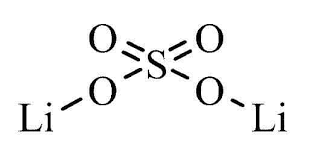Lithium Battery & Electrolyte Chemicals
Pharmaceutical & Fine Chemicals

Lithium sulfate is a white inorganic salt with the formula Li2SO4. It is the lithium salt of sulfuric acid.
Product:
Lithium Sulphate
CAS:
10377-48-7
Synonym:
Dilithium sulfate; Sulfuric acid, lithium salt
Structure:

Appearance
White crystalline solid
Density
2.22 g/cm3
Melting point
845 °C
Molecular Weight
110
Purity
99.5%
Refractive index
1.465
A few of the grades available are listed below:



Lithium sulfate, an inorganic compound, has various industrial applications owing to its unique properties. Here's a list of some of its industrial uses: